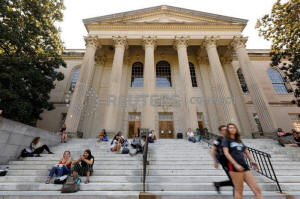|
China warns students, academics of risks
of studying in U.S.
 Send a link to a friend
Send a link to a friend
 [June 03, 2019]
BEIJING (Reuters) - China warned
students and academics on Monday about risks involved in studying in the
United States, pointing to limits on the duration of visas and visa
refusals, amid a bitter trade war and other tension between the two
countries. [June 03, 2019]
BEIJING (Reuters) - China warned
students and academics on Monday about risks involved in studying in the
United States, pointing to limits on the duration of visas and visa
refusals, amid a bitter trade war and other tension between the two
countries.
Relations between China and the United States have nosedived because of
their trade conflict, U.S. sanctions on Chinese tech firm Huawei
Technologies Co Ltd and tension over the disputed South China Sea and
U.S. support for Chinese-claimed Taiwan.
The Ministry of Education, in a short statement, said that recently some
students seeking to study in the United States had encountered problems
with the duration of their visas being limited and an increase in visa
refusals.
"This has affected Chinese students going to study in the United States
or smoothly completing their studies," it added.
"The education ministry reminds students and academics of the need to
strengthen risk assessment before studying abroad, enhance prevention
awareness, and make corresponding preparations."

However, state television cited ministry spokeswoman Xu Mei as saying
despite the trade tensions, the "general situation" for Chinese students
going to the United States remained stable, and U.S. institutes of
higher education welcomed Chinese students and cooperation with China.
The ministry declined to offer any other details when contacted by
Reuters.
At stake is about $14 billion of economic activity, most of it tuition
and other fees generated annually from the 360,000 Chinese nationals who
study in the United States.
Hu Xijin, editor of the widely read Chinese newspaper the Global Times,
linked the warning to recent discrimination against students faced and
the trade dispute.
"This warning is a response to recent series of discriminatory measures
the U.S. took against Chinese students and can also be seen as a
response to the U.S.-initiated trade war," Hu wrote on his Twitter
account in English.
'REALLY SCARY'
The warning quickly became a top trending topic on China's Weibo
microblogging site, with some people expressing concern about going to
the United States and others saying they would just go to other
countries.
"This is really scary," wrote one user.
[to top of second column]
|

Students sit on the steps of Wilson Library on the campus of
University of North Carolina at Chapel Hill, North Carolina, U.S.,
September 20, 2018. REUTERS/Jonathan Drake/File Photo

"The world is so big, why do you have to go to the United States?"
wrote another.
Last year, China's embassy in Washington issued a security advisory
to Chinese nationals traveling to the United States, warning
tourists to be aware of issues including expensive medical bills,
the threat of public shootings and robberies, and searches and
seizures by customs agents.
A group of U.S. President Donald Trump's fellow Republicans in
Congress introduced legislation last month intended to prohibit
anyone employed or sponsored by the Chinese military from receiving
student or research visas to the United States.
The bill would require the U.S. government to create a list of
scientific and engineering institutions affiliated with China's
People's Liberation Army, and prohibit anyone employed or sponsored
by those institutions from receiving the visas.
The bill comes as some U.S. officials have expressed concern about
the possibility of the theft of intellectual property or even
espionage by Chinese nationals at U.S. universities and other
institutions.
Many U.S. and university officials also warn about over-reacting,
however, arguing it is important to acknowledge the important role
Chinese scholars and students play at U.S. institutions while being
aware of security risks.
(Reporting by Ben Blanchard; Additional reporting by Michael Martina
and Gao Liangping; Editing by Robert Birsel)
[© 2019 Thomson Reuters. All rights
reserved.]
Copyright 2019 Reuters. All rights reserved. This material may not be published,
broadcast, rewritten or redistributed.
Thompson Reuters is solely responsible for this content.
 |